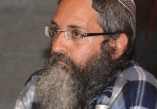1202
What the Rabbis are teaching us is that there is a causal connection between these three statements and periods. Yirmiya asked in deep pain how the tragedy of destruction could have occurred. The answer was from the prophet Yeshaya, who preceded him: how could the people of the formerly trustworthy city be so treacherous and unfaithful (Yeshaya 1:21). The question of how that could be the moral state finds answer from the time of Moshe, who had such trouble dealing with the bickering and arguments from his constituents.
Indeed we have a principle regarding Jewish history that the development of historical processes is not by chance but based on internal connections. From where did the roots of destruction emanate? Hashem invited the nation to receive the Land that he chose for them (Devarim 1:8). It could have been much easier. Instead, their actions caused them to wander in the desert for 40 years and then not complete the task of expelling the nations and taking full control of the Land throughout the time of the Judges and even the early Kings. The Torah explains: "You did not desire to go up [to the Land], and you disobeyed the word of Hashem" (ibid. 26). Rashi explains that there was nothing stopping them, and they could have taken the Land without battle or weapons if not for the sin of the spies.
But even the spies are just a link in the chain. It began with what Moshe complained of – the people’s lack of trust in their Torah leadership. Even when the problems emanated from the people, they blamed their leadership. They saw the Torah and its espousers as their problem. This caused the moral deterioration that Yeshaya spoke of, which lead to the destruction that Yirmiya witnessed. First, the people were internally destroyed; then, the kingdom fell.
The way to improve things follows the same line. First there must be trust in the Torah and its spokesmen. This is as our haftara prescribes: "I will return your judges as they were originally and your advisors as from the outset; then you will be called the city of justice, the trustworthy town" (Yeshaya 1:26).
The Pillar and the Altar
- Parahsat Shoftim Two Ways of God- Worship
Rabbi Hillel Geffen | Elul 5761

Why is Hafrashat Challah So Important
Rabbi Yosef Tzvi Rimon | 5778

How Does a Heter Iska Work?
Rabbi Yirmiyohu Kaganoff | 5770








